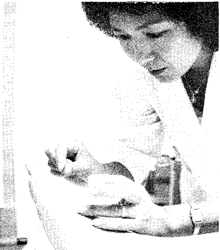By Richard A. and Iva Lim Peck
A patient had called earlier asking in a somewhat hesitant manner the standard questions asked about acupuncture – will it hurt, where will the needles be put, how long does it take, how many treatments will be needed, and to the patient the most important of all questions, “will it work, and if it does work, how long before the symptoms return?”
Now, in the office, the patient ex- plains the long history of debilitating migraine headaches that seem to come and go regularly. The question of whether or not acupuncture will work naturally arises. The answer, as it is explained, depends on the individual – each of us having a different genetic structure, habits, lifestyle, working environment, presence of functional disorders, etc. “Will the migraine return?” The answer is not clear and definitive, undoubtedly not the “yes-no” answer the patient was looking for.
 The treatment for migraine headaches, as with other problems seen and treated by an acupuncturist, is only the start to recovery. The underlying cause of the problem may return. It is the responsibility of the acupuncturist and patient to help prevent the recurrence of such problems. How do we prevent such recurrences from happening? If there is an answer it is in the underlying theory of Yin and Yang. This philosophical theory is the basis for acupuncture, and is also the foundation for many other aspects of Chinese culture. In fact it is so pervasive that it touches on almost everything that is Chinese.
The treatment for migraine headaches, as with other problems seen and treated by an acupuncturist, is only the start to recovery. The underlying cause of the problem may return. It is the responsibility of the acupuncturist and patient to help prevent the recurrence of such problems. How do we prevent such recurrences from happening? If there is an answer it is in the underlying theory of Yin and Yang. This philosophical theory is the basis for acupuncture, and is also the foundation for many other aspects of Chinese culture. In fact it is so pervasive that it touches on almost everything that is Chinese.
Numerous articles have been written explaining this ancient concept. Yin and Yang is our way of verbalizing the concept of opposing forces we see in everyday life. The energy field within our body is one such contrast. A good acupuncturist, knowing that the imbalance of Yin and Yang leads to disease and pain, will help the patient by balancing these energies. This is the first start to recovery, but should not be thought of as the only way to correct the problem.
A question arises as to why there is such an imbalance in the first place, and how do we prevent it from recurring. There is no one easy answer to this, but our diet, exercise, daily habits, the weather, etc., all have a bearing on why an imbalance exists and what causes the imbalance to appear.
The acupuncture treatment can have a dramatic effect on balancing this energy. Many patients remark that the relief is almost instantaneous. The Yin and Yang within the body is comparable to the western concept of homeostasis or the natural rhythm and balance of the body.
The same balancing that takes place in acupuncture can be achieved through other means. The Chinese believe that our energy comes from what we eat and drink, the air we breathe and the exercise we do. The food we eat also can be classified as Yin and Yang. Thus an absence or excess of one type of food can lead to an imbalance within the body. A good example would be the relationship between salt and hypertension.
The amount of Yin or Yang foods ingested can also help us reach homeostasis. The acupuncturist will question the patient about the diet and make recommendations as to what the patient should or should not eat to continue the corrective treatment that has been started by acupuncture. In conjunction with the food we eat is Chinese herbs. Again like acupuncture the object is to balance the energy within the body. Where there is a deficiency then tonification is needed; where there is an excess then dispersion is needed. While the results of acupuncture can be dramatic, the results from the food we eat and the herbs we take usually is not as drama- tic. The effect can be thought of as a gradual building, recuperating and rejuvenating process; and in many cases enhancing the effect of acupuncture.
In ancient China, many acupuncturists practiced the slow graceful movements of Tai Chi Chuan. It was found that this exercise benefits not only the external body but also the internal organs. Those that had physical problems would see the acupuncturist, who would first treat with acupuncture, followed by diet and herbs if necessary, and then Tai Chi Chuan.
Tai Chi Chuan does not have the immediate effects as does acupuncture. The effect comes in a gradual process of changing the body. Only after practicing for a while will the results be experienced.
Acupuncture is only a start in the recovery process. The combined result of nutrition, exercise, and acupuncture is far more superior in many instances than acupuncture alone.
– This article was originally published in the November 1987 edition of Circle of Light.

